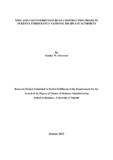| dc.description.abstract | Many projects in developing countries encounter considerable time and cost overruns, fail to
realize their intended benefit or are even totally terminated and abandoned before or after
their completion. This study sought to investigate the factors that contribute to time and cost
overruns in road construction projects in Kenya. The study adopted a multiple case study and
was guided by the following specific objectives; to identify variables influencing road
construction time and cost overruns in Kenya, to establish the relative importance of these
variables and to determine the quantitative impact of time and cost overruns in road
construction projects in Kenya. The study utilized both primary and secondary data. Primary
data was collected using a semi-structured questionnaire while secondary data was obtained
from annual corporate reports, KeNHA database, contract documents, claims reports, project
completion reports, expenditure data bases, project progress reports, and donor agency
reports on various road projects run by KeNHA. The target population consisted of 24
successfully completed road projects undertaken by KeNHA in the last three fiscal years. A
40 percent random sample (10 projects) was taken from the sampling frame for the study. A
4-point Likert scale was used to measure the output of each item answered by the
participants. Descriptive statistics were used to describe (and analyze) the variables
numerically. Principal component analysis was applied to cluster the various variables for
easy analyzability, which extracted the following factors as the most critical factors causing
time and cost overruns; increase in scope of work, delayed payments to the contractor; poor
cost control, foreign exchange rate fluctuations, poor or inadequate specifications in the
contract, and unpredicted weather. The Relative Importance Indicator (RII) was used to
measure the likelihood or recurrence of the variable from the respondent’s point of view.
According to the RII analysis, 35 variables had a high possibility of recurring in future
similar projects. A multiple linear regression model was used to establish the relationship
between the various factors and time and cost overruns in the selected road projects. Time
overruns constituted the project time extension in months while cost overrun was measured
by the total cost deviations from the initial project cost estimates. Increase in scope of work
can be considered to have been the lead factor in contributing to time and cost overruns on
the road projects. The other factors in order of significant were delayed payments to
contractors, poor or inadequate specifications in the contract, foreign exchange rate
fluctuations, unpredictable weather and poor cost control mechanisms. At macro-level, the
study recommends that policy makers both at county and national level formulate strategies
geared towards mitigating the impact of these factors given the fact that most of them have a
high chance of recurring in future road projects. At the micro-level, contractors,
consultancies, and other stakeholders need to do proper definition of project scope and apply
modern project management tools given the fact that increase in scope of work is a lead
factor in the factor contributing to time and cost overruns on road projects. At the preliminary
stages, enough material and time resource’s should be committed to ensure that adequate
feasibility studies are conducted to avoid duality. The study was limited to the extent that; a
study of this magnitude should include a survey of sizeable number of road projects over a
wider time span of, say 10 years. On the other hand, the study period was a-bit short for a
study of this nature and the fact that some of the respondents were non-committal posing
major challenge in the field during the data collection. Studies involving confirmatory factor
analysis will need to be carried out to further test the model so established and to confirm the
findings of this study. Having identified the factors causing time and cost overruns in road
projects in Kenya, there is need for further research to focus on the critical success factors in
the implementation of road construction projects in Kenya. | en_US |

